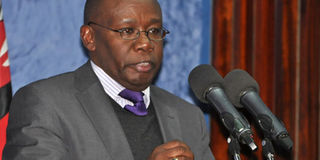AG Githu Muigai defends Government on devolution

Attorney General Githu Muigai. He defended the government against claims that it is reluctant to implement devolution. PHOTO/SALATON NJAU
What you need to know:
- The AG argued there was no way devolution could be avoided because it is the pillar of the Constitution
- He blamed the current Constitution for bringing about contradictory regulation
Attorney General Githu Muigai has defended the national government against claims that it is reluctant to implement devolution.
Prof Muigai called the accusations as simply “political posturing” and argued there was no way devolution could be avoided because it is the pillar of the Constitution.
“Our position is simple and it is that we are committed irrevocably to the rule of law. We are committed to entrenching the constitution. We are committed to its implementation,” he said in a speech on Monday evening at the Canadian High Commission in Nairobi,
“Sometime, you hear, you read very pejorative remarks that devolution is about to be killed, that the government is not committed to devolution. I think that is political posturing.”
“How anybody can say that a government would not be committed to a third of the constitution is in my view unhelpful in the debate,” he added.
The AG made the remarks during the launch of a book: Ethnicity, Nationhood and Pluralism: Kenyan Perspectives, a collection of essays by academics on how Kenya political scenes change and how tribes affect them.
The book has been edited by Kenyan constitutional law scholars Prof Yash Pal Ghai and his wife Jill Ghai. The book’s publication is a project by the Global Centre for Pluralism which is an initiative of the Aga Khan and was published by the Katiba Institute in Nairobi.
A number of politicians especially in the Cord alliance have previously accused the national government of trying to arm-twist governors through fund delays, a charge the government denies.
The argument morphed into a call for a referendum last month when Cord leader Raila Odinga joined governors to call for an increment of up to 40 per cent funds allocation to counties.
The Jubilee government on the other hand argued that increasing allocation did not require a referendum and pledged to raise the monies gradually.
Another problems is on which duties should be devolved to the counties and when counties should take over the role of paying. On Monday evening, Prof Muigai blamed the current Constitution for bringing about contradictory regulation.
“The constitution itself contains serious inconsistencies, lacuna and sometimes outright contradictions. And we are going through a phase in which we are asking the courts over and over again to help us work out so that the constitution becomes simpler.”
“We have the correct system but it will be a long and arduous.”
The Constitution was passed in 2010 to allow some powers to be decentralised through counties in a bid to diffuse the perception that presidencies were benefiting communities where they came from.
But Canadian High Commissioner to Kenya David Angell said the teething problems being seen now are not new to any country adopting the devolved system.
“Devolution is about finding place for different levels of government. It is often a tough system, and especially at the point of departure, it takes a while for those different levels to find a way of accommodating each other,” he told the Nation.
“The time lines in this constitution are extremely ambitious and Kenya is trying to do in a few years what it took Canadians two or more generations to do. We have encountered some of these challenges ourselves for example how different levels of government work together.”
Canada’s form of devolution is federalism which is different from Kenya’s system but they are similar in the way the national government and regional governments have to coordinate their functions.





